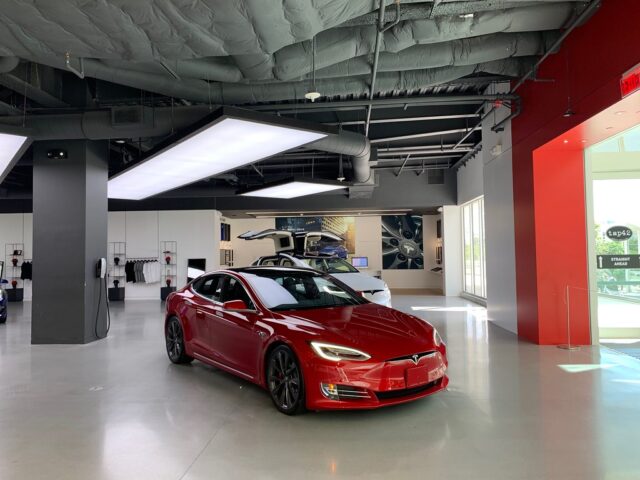
Written by Rebecca Betterton – 6 min read – Edited by Rhys Subitch
The electric vehicle market has dramatically grown over the past year, EVs and hybrids made up 4.5 and 6.6 percent of new registrations from January through June 2022, respectively, according to a 2022 second quarter market trend report by Experian. But even as options outside of Teslas and Toyotas grow, diving in head first to a brand new vehicle type can be daunting. And with an average price of over $66,000 on the line for an electric vehicle, the choice is loaded — financially and logically. If you fall into a category of curiosity rather than confidence, leasing an EV can help you decide if an eco-friendly ride is right for you, while buying is best for drivers ready to commit.
Leasing an electric car can give you hands-on experience with an otherwise expensive vehicle, but can cost more in the long run if you surpass restrictions or buy it at the end of the lease.
Is it better to lease or buy an electric car?
When it comes to the question of whether to lease or buy your next vehicle it is fairly simple to determine which route is best for you and your wallet.
- If you intend to switch up your vehicle every few years and can handle mileage restrictions then leasing can be great.
- If you want the freedom of ownership, buying is the way to go.
But the world of electric vehicles is still in its infancy, even with EV sales increasing 40 percent year over year. So signing off on long-term ownership for a vehicle seemingly new to the market can feel risky. To determine which is right for you consider the benefits and drawbacks of each option.
Leasing an electric car
Pros to leasing an EV
- Vehicle warranty
- Lower monthly payment
- Newest tech features
Cons to leasing an EV
- Faster vehicle depreciation
- Inability to sell vehicle
- Vehicle restrictions
Benefits to leasing an electric car
The advantages to leasing an electric car come down to added protection through a comprehensive vehicle warranty — meaning fewer trips to the mechanic — a lower monthly cost and access to the newest technology.
Vehicle warranty
Generally, vehicle leases last 24 or 36 months, and in that time your vehicle may run into technical issues. When it comes to EV maintenance, the need for a new battery is the most common issue you might encounter. But when leasing, your vehicle will likely still be covered by warranty — giving you the potential to save thousands of dollars.
Lower monthly payment
Leasing a car allows you the ability to drive the vehicle for a set amount of time, paying each month. It often costs less each month than a car payment for the same vehicle. On top of a lower monthly cost, you will also spend less money upfront and likely leave the lot without putting any money down.
The average monthly cost for leasing a new car in the fourth quarter of 2022 was $540 versus $667 for buying, according to Experian.
Newest tech features
While model changes year over year for conventional vehicles are not dramatic, the EV field is advancing at a much faster rate. Leasing will give you the chance to be on the cutting edge when it comes to available technology, rather than being stuck with last year’s add-ons. The Hyundai Kona for example received some notable upgrades from the 2021 to 2022 model, including an updated infotainment center and new driver assistance technology.
Drawbacks of leasing an electric car
While leasing an EV can expose you to the experience of driving electric, it does come with some downsides. Primarily the challenge of lease approval, inability to leave the lease and vehicle restrictions.
Lease approval
Gaining approval to lease a vehicle can prove to be much more difficult than for an auto loan — especially for those with poor credit. Although you still may be able to lease without a perfect credit score, it will likely mean a steeper monthly payment. Consider the average credit score for drivers leasing new cars in the second quarter of 2022 — 736 — which falls above the 729 average for a loan, according to Experian.
Inability to sell the vehicle
Leaving a car lease is not easy or inexpensive. So if you end up not liking the vehicle you lease you will likely be trapped in the lease or be expected to pay hefty fines to exit the agreement. Depending on your lessor, you may be expected to pay out the residual value in addition to remaining lease payments and fees.
Vehicle restrictions
When signing off on an auto lease there are a few main aspects to look out for: mileage, maintenance and vehicle modification. If you lease your EV you will likely be limited to driving anywhere from 12,000 to 15,000 miles a year, may have to foot the bill for maintenance and cannot customize the vehicle.
Buying an electric car
Pros to leasing an EV
- Full ownership
- No vehicle restrictions
- Tax incentives and credits
Cons to leasing an EV
- Expensive upfront cost
- Rapidly changing tech
- Out-of-pocket repair costs
Benefits to buying an electric car
The main attraction of buying an electric car instead of leasing comes down to the excitement of full ownership. You can do whatever you would like with your vehicle without being limited to what the leasing company has available or worrying over fees. As an EV owner, you can also take full advantage of tax incentives and credits that otherwise would be directed to the lessor.
Full ownership
Depending on where you stand financially, buying an EV can allow you to pay off your loan at your own speed and place you in total control of your vehicle. You will have a firm grasp on your total cost upfront instead of worrying about potential wear-and-tear charges that can add up at the end of a lease.
No vehicle restrictions
If you feel that the freedom of the open road should not be restricted, then buying an EV might be a better option for you. This way you will not be held captive by the vehicle odometer, and can enjoy the freedom of the open road. Other than the ability to drive without limitation, full ownership allows you the ability to add any bells and whistles that suit you to customize your vehicle.
Tax incentives and credits
When purchasing an EV, you can benefit from a multitude of financial incentives. One of which, the federal EV tax credit, can be worth up to $7,500 dollars. Many states also offer rebates to lower the cost to purchase a climate-conscious vehicle. But these incentives apply only to the owner of the vehicle, so if you were to lease you would not benefit from them.
Drawbacks of buying an electric car
The EV space has expanded, and more budget-friendly options are popping up, but these vehicles do still tend to carry a higher price tag than a conventional option. Higher prices also come with quickly changing tech and higher maintenance costs.
Expensive upfront cost
Electric vehicles tend to be much more expensive than conventional vehicles, an average of $66,997 according to Kelley Blue Book June 2022 data. EV drivers also tend to carry almost identical credit profiles to those financing luxury cars and pay large down payments, according to a TransUnion report. This can make approval more of a challenge for borrowers with less-than-perfect credit scores.
Shop and save
Borrowing money for an electric vehicle requires the same approach as one would take to save money on a conventional loan: Shop around, apply for loan preapproval and don’t be afraid to walk away.
Rapidly changing tech
Innovation in the electric car field is rapid, and this is especially true as legacy brands, like Ford with the Mustang Mach-E and Chevrolet’s Bolt, enter the space. But this growth also means you will be stuck with the currently available tech in the vehicle you buy. While advancements may seem slight to the naked eye, if flashy tech serves as a main attraction, consider leasing to stay up with trends.
Out-of-pocket repair costs
As with any vehicle under your ownership, you must pay for any necessary maintenance that comes during ownership. But when it comes to an EV, this maintenance can be much more expensive than typical trips to the mechanic. Although the warranty for the battery component will likely extend five to 10 years, EVs require replacement for other costly repairs like screens and advanced system updates.
The bottom line
It is best to approach the question of leasing versus buying an EV in the same way you would when shopping for a conventional car. For some, the benefits of the newest available tech may outweigh the lack of full ownership — while, for others, getting behind the wheel of a vehicle with confidence and incentives makes more sense.
If you decide to buy an EV, do your research to understand the additional costs associated with ownership and take advantage of green auto loans. Leasing an EV, on the other hand, requires the same attention as it would typically. Review a few offers and understand the whole of the contract before committing to a lease.
Republished with permission[/vc_message]
This article originally appeared here and was republished with permission.












